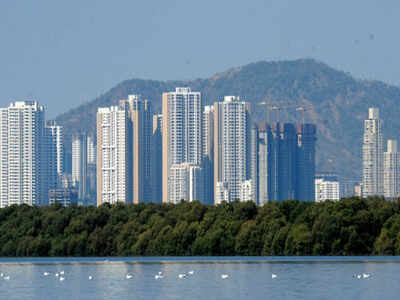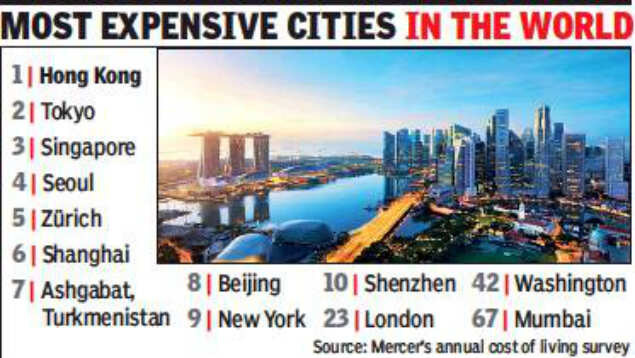
BENGALURU: Mumbai, India’s most expensive city, appears to have become more affordable. A recent survey says that it has slipped 12 spots on the global cost of living index to 67 from 55.

The reason for the drop, according to Mercer’s annual global cost of living survey, is that prices of surveyed basket of goods in the city have risen at a relatively slower rate of inflation at 1.8%, with cost of eating out and food away from home showing a drop.
On the other hand, though, Mumbai continues to figure among the over eight Asian cities in the global Top 20 most expensive locations surveyed for expatriates. Also, its residential housing prices continue to be among the most expensive in the world.
Among Indian cities, Mumbai was followed by New Delhi at 118 and Chennai 154. New Delhi and Chennai, too, have become relatively more affordable over the year, dropping 10 and 15 points, respectively. Meanwhile, Bengaluru at 179 and Kolkata at 189 have been ranked the least expensive Indian cities.
The survey includes 209 cities across five continents and measures the comparative cost of more than 200 items at each location, including housing, transportation, food, clothing, household goods and entertainment.
It measures different criteria such as cinema tickets, which are as high as $25 in London and as cheap as $5 in Mexico City or Mumbai, a cup of coffee which is priced at $8 in Hong Kong but merely $2 in Cape Town, and a typical fast food meal such as a Big Mac which costs $15 in Zurich and $3 in Johannesburg.
“A number of factors, including currency fluctuations, cost of inflation for goods and services, and volatility in accommodation prices, contribute to the overall cost of expatriate packages for employees on international assignments,” stated the survey, which MNCs use while calculating compensation packages for employees on international assignments.
Another reason for Mumbai and other cities’ relative affordability for foreigners has been movement of the dollar against the rupee. “A relatively slower price increase in surveyed Indian cities and major currencies weakening against the US dollar has pushed our Indian cities down in the ranking,” said Padma Ramanathan, India global mobility practice leader, Mercer.
Meanwhile, there has been an increase in hiring by Indian MNCs in countries such as US, UAE, UK, Kenya and closer home Bangladesh.
“Globally, companies are looking at emerging megacities as a business, and talent is imperative to maintain a competitive advantage in future. For example, it is expected that the Asian continent will play host to most of the emerging megacities, and rising cost of living rankings in the region indicate a need to continuously monitor the costs of doing business and revisit workforce strategies on a more frequent basis,” states the report.

The reason for the drop, according to Mercer’s annual global cost of living survey, is that prices of surveyed basket of goods in the city have risen at a relatively slower rate of inflation at 1.8%, with cost of eating out and food away from home showing a drop.
On the other hand, though, Mumbai continues to figure among the over eight Asian cities in the global Top 20 most expensive locations surveyed for expatriates. Also, its residential housing prices continue to be among the most expensive in the world.
Among Indian cities, Mumbai was followed by New Delhi at 118 and Chennai 154. New Delhi and Chennai, too, have become relatively more affordable over the year, dropping 10 and 15 points, respectively. Meanwhile, Bengaluru at 179 and Kolkata at 189 have been ranked the least expensive Indian cities.
The survey includes 209 cities across five continents and measures the comparative cost of more than 200 items at each location, including housing, transportation, food, clothing, household goods and entertainment.
It measures different criteria such as cinema tickets, which are as high as $25 in London and as cheap as $5 in Mexico City or Mumbai, a cup of coffee which is priced at $8 in Hong Kong but merely $2 in Cape Town, and a typical fast food meal such as a Big Mac which costs $15 in Zurich and $3 in Johannesburg.
“A number of factors, including currency fluctuations, cost of inflation for goods and services, and volatility in accommodation prices, contribute to the overall cost of expatriate packages for employees on international assignments,” stated the survey, which MNCs use while calculating compensation packages for employees on international assignments.
Another reason for Mumbai and other cities’ relative affordability for foreigners has been movement of the dollar against the rupee. “A relatively slower price increase in surveyed Indian cities and major currencies weakening against the US dollar has pushed our Indian cities down in the ranking,” said Padma Ramanathan, India global mobility practice leader, Mercer.
Meanwhile, there has been an increase in hiring by Indian MNCs in countries such as US, UAE, UK, Kenya and closer home Bangladesh.
“Globally, companies are looking at emerging megacities as a business, and talent is imperative to maintain a competitive advantage in future. For example, it is expected that the Asian continent will play host to most of the emerging megacities, and rising cost of living rankings in the region indicate a need to continuously monitor the costs of doing business and revisit workforce strategies on a more frequent basis,” states the report.
World Cup 2019
Trending Topics
LATEST VIDEOS
More from TOI
Navbharat Times
Featured Today in Travel
Quick Links
Lok Sabha Election Schedule 2019Lok Sabha Election NewsDelhi Capitals teamMI team 2019Rajasthan Royals 2019RCB team 2019Maharashtra Lok Sabha ConstituenciesBJP Candidate ListBJP List 2019 TamilnaduShiv Sena List 2019AP BJP List 2019Mamata BanerjeeBJP List 2019 MaharashtraPriyanka GandhiBJP List 2019 KarnatakaAMMK Candidate List 2019BJP List 2019 WBLok Sabha Elections in Tamil NaduBSP List 2019 UPNews in TamilLok Sabha Poll 2019Satta Matka 2018PM ModiMahagathbandhanNagpur BJP Candidate ListChandrababu NaiduTamil Nadu ElectionsUrmila MatondkarNews in TeluguMadras High CourtTejashwi YadavArvind KejriwalTejasvi SuryaPawan KalyanArvind KejriwalYogi AdityanathJaya PradaSatta King 2019Srinagar encounter
Get the app









